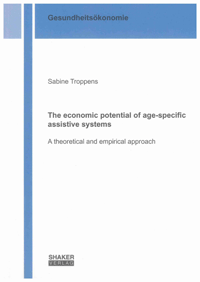
Shop : Review copy
Shop
Review copy

March 2014
Sabine Troppens
The economic potential of age-specific assistive systems
A theoretical and empirical approach
Over the past 15 years there has been an increasing interest in technical assistance and appropriate services allowing for ageing in place and assisted living. These goods are said to affect public and private expenditures in social security systems in the long run, since they avoid relocations or an increase in individual care levels. Furthermore, they put the private home centre-stage, with it becoming a pillar in health, care, communication and self-management besides institutional settings. The thesis focuses the contribution of assistive systems and their components, i.e. technological products and different kinds of technological and non-technological services, to healthy and independent ageing. Based on informatics, environmental gerontology, and health economics, the author describes diverse interactions between aging persons and assistive technologies that are embedded in the physical and social, objective and subjective, known and unknown environment. The diffusion of assistive products and services among the elderly, who are regarded as the leading target group, fosters the prosperity of a market potential. However, the task of capturing the supply and the demand is difficult, since assistive products and services are not perceived as an autonomous economic sector. Moreover, an internationally accepted definition and demarcation of assistive goods, which are described by terms like “Ambient Intelligence”, “E-Health”, or “Ambient Assisted Living” is lacking. The thesis bridges the gap, providing working definitions of goods, technologies, submarkets, and target groups. A formal approach is presented to define baskets of assistive goods in different submarkets (Home Automation, Home Safety & Security, Health & Care, as well as Communication, Entertainment & Social Networking), according to specific needs of the user. Taking into account the willingness to accept, to use and to pay for such goods, scenarios derive empirical data on the potential consumption of in-home assistance among older adults.
Keywords: assistive technology; healthy ageing; ageing in place; ambient assisted living
Shaker Verlag GmbH
Am Langen Graben 15a
52353 Düren
Germany
Am Langen Graben 15a
52353 Düren
Germany
Mon. - Thurs. 8:00 a.m. to 4:00 p.m.
Fri. 8:00 a.m. to 3:00 p.m.
Fri. 8:00 a.m. to 3:00 p.m.
Contact us. We will be happy to help you.

